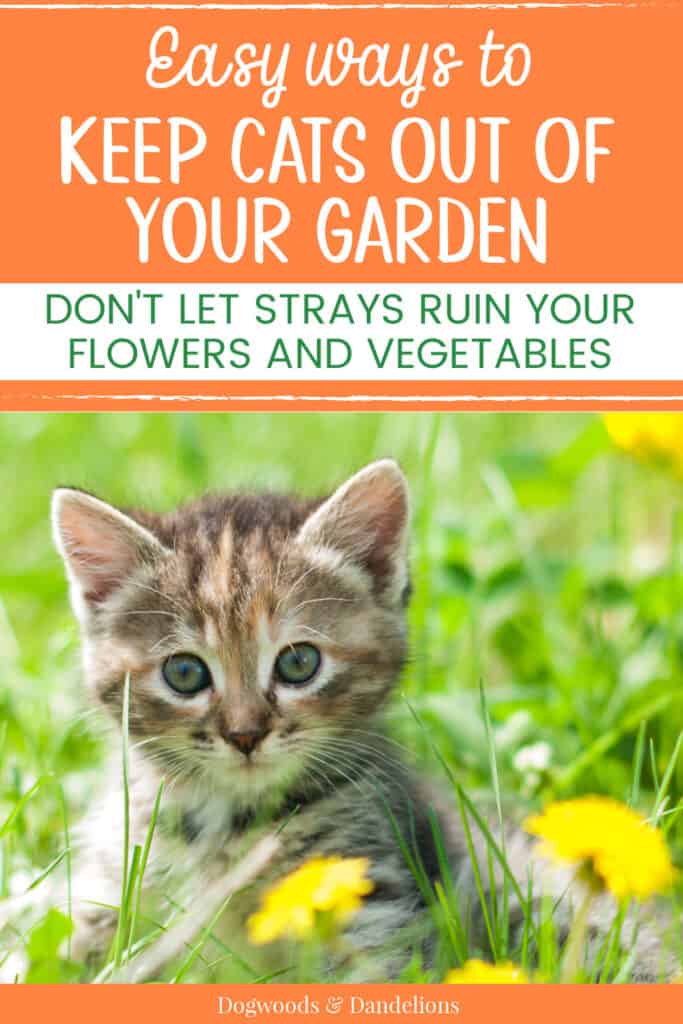How to Keep Cats Out of the Garden
Inside: Learn how to keep cats out of your garden and why they can pose a problem.
Have you ever found yourself wondering how to maintain a flower or vegetable garden free from disruption by neighborhood cats (or even your own felines)?
If so, you’re not alone.
We live out in the country and often have stray cats wander by and I definitely don’t want them digging up my newly planted seedlings or “doing their business” in my vegetable garden.
Since there are some health hazards to cats using your garden as a bathroom let’s learn some ways to keep cats from ruining your garden.
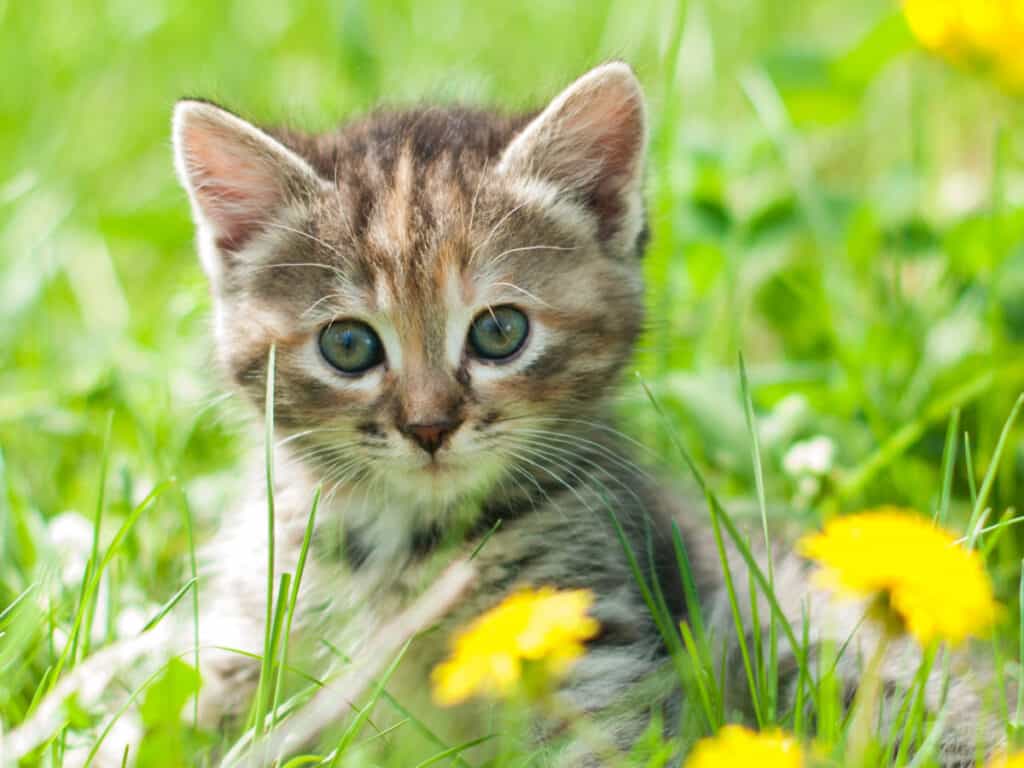
Why You Shouldn’t Allow Cats in Your Garden
Cats love to use soft garden soil for a litter box, but they can also dig up and destroy your plants, especially newly planted seedlings.
And the smell of cat waste can turn your stomach. I don’t want to have to smell cat urine and be scooping poop from other people’s pets in my own garden.
But there is an even bigger issue at stake. When cats use the bathroom in your garden, they can deposit all kinds of potentially dangerous things that can harm your plants. Their feces often contain toxoplasmosis, bacteria, and other parasites that you don’t want on your vegetables.

If a cat poops on or near any root crops, they should be dug up and destroyed, not eaten. And if a cat has been allowed to poop in your garden regularly, you should consider removing all the soil and starting over with new dirt.
Since I don’t want to have to throw away my hard work growing vegetables, I prefer to keep the cats out of my garden from the beginning.
These are some of the ways I have tried or read about that work with varying degrees of success. Since all cats are different, some ideas may work on some cats and not on others. My best recommendation is to try one or two out at a time and see what works best for you.
Affiliate Disclosure: Please note that some of the links in this article may be affiliate links and I may receive a small commission if you purchase something through a link. It will not change your cost. As an Amazon Associate, I earn from qualifying purchases. For more information, see my disclosures page.)
How to Keep Cats Out of Your Garden
There are quite a few ways to keep cats out of your garden. But I do want to be clear. There is nothing wrong with your pet cat assisting you in your garden while you work. This article is mainly focused on keeping strays and neighbor’s cats out.
Cats only become a problem when they “do their business” among your garden vegetables. So if you enjoy your cat’s company while working in your garden, feel free to bring them along. Just keep a close eye on them and remove them before they need to use the bathroom.
Physical Barriers – A Good Fence
The best way to keep felines out of your garden is to install a fence around the perimeter. A 3-foot high fence is generally enough to deter most cats, though many cats can jump over it if they try.
The fence can be made of almost anything you choose. There are fancy fences made of wooden boards that would certainly look beautiful. But even a simple chicken wire fence will usually keep the cats out. Keep in mind, that the fence needs to be tight enough that cats can’t slip through the slats or underneath.
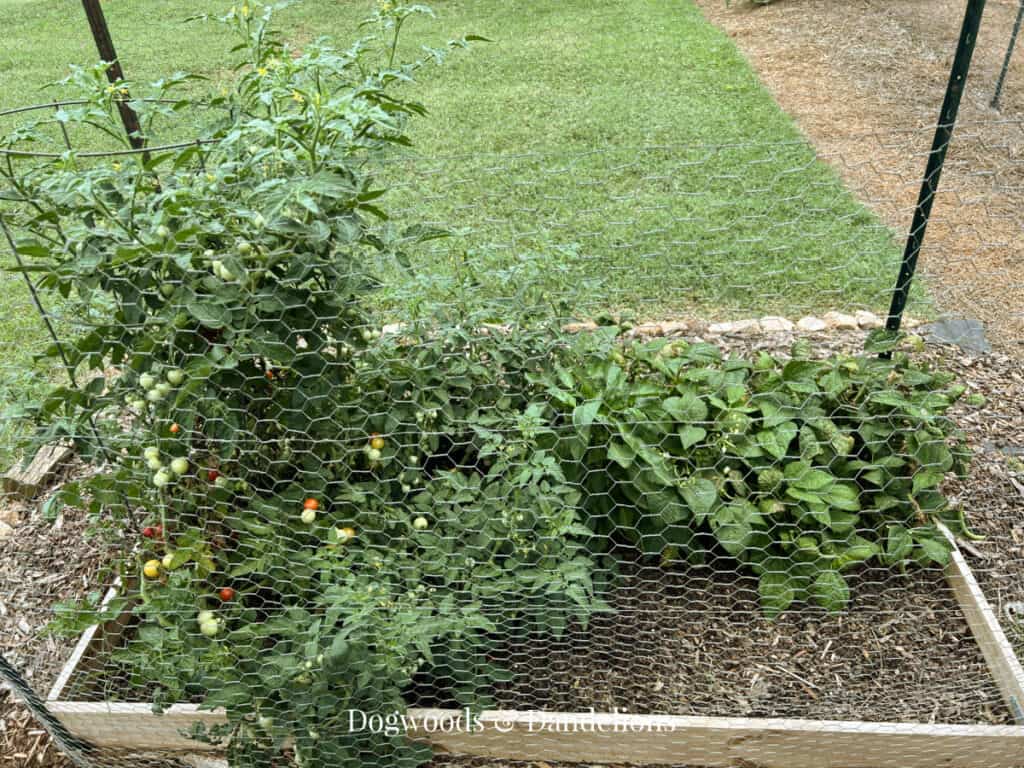
If you want a fence but don’t want to install something permanent, some simple bird netting between some T-posts is likely to be enough to keep the cats from digging in your garden.
Unfortunately, installing a fence isn’t always practical. Fences can be difficult to mow around and if you have a large garden, fencing can be expensive.
Other Physical Barriers
There are other ways to protect your garden using things you may already have around the house. Cats don’t like sharp and prickly surfaces so plastic forks (with tines sticking up), pine cones, or holly cuttings pushed into the soil around your plants can create obstacles that are unwelcoming to felines.
Laying chicken wire on top of your soil can also deter digging activities, as cats don’t like to walk across the uncomfortable mesh. All these measures create a physical barrier that protects your garden beds, keeping them feline-free.
Natural Deterrents
There are some natural deterrents that can help keep cats from using your garden as a litter box. Cats usually aren’t fans of strong smells. So items like citrus peels, coffee grounds, and some essential oils can work to repel cats and keep them away.
You can scatter lemon, lime, or orange peels throughout your garden or try sprinkling coffee grounds around your plants. By creating a smelly barrier around your garden, cats may find the odor too offensive to cross.
You can also use diluted essential oils in a spray bottle that can be applied to the soil around and in your garden to leave a scent that feral cats find distasteful. Lemon, lime, and orange essential oils work well but you can also use lavender, eucalyptus, and citronella.
To make a cat repellent spray for your garden, mix 2 Tablespoons of witch hazel, 40 drops of essential oil or oils of your choice, and 3/4 cup water into a spray bottle. Add spray top and shake gently.
Many recipes I found online just use water and essential oils. I guess people have forgotten basic high school science that oil and water don’t mix.
Apply the spray liberally to the soil around your garden. You will need to reapply often as the scent will fade. It will also need to be reapplied after a rainfall.
Using Plants to Keep Cats Out
You can also add some plants to your vegetable garden that cats aren’t overly fond of. The coleus canina, fondly known as the scaredy cat plant, is one example. It was specifically bred by a German botanist to keep cats away and has been used for centuries in gardens.
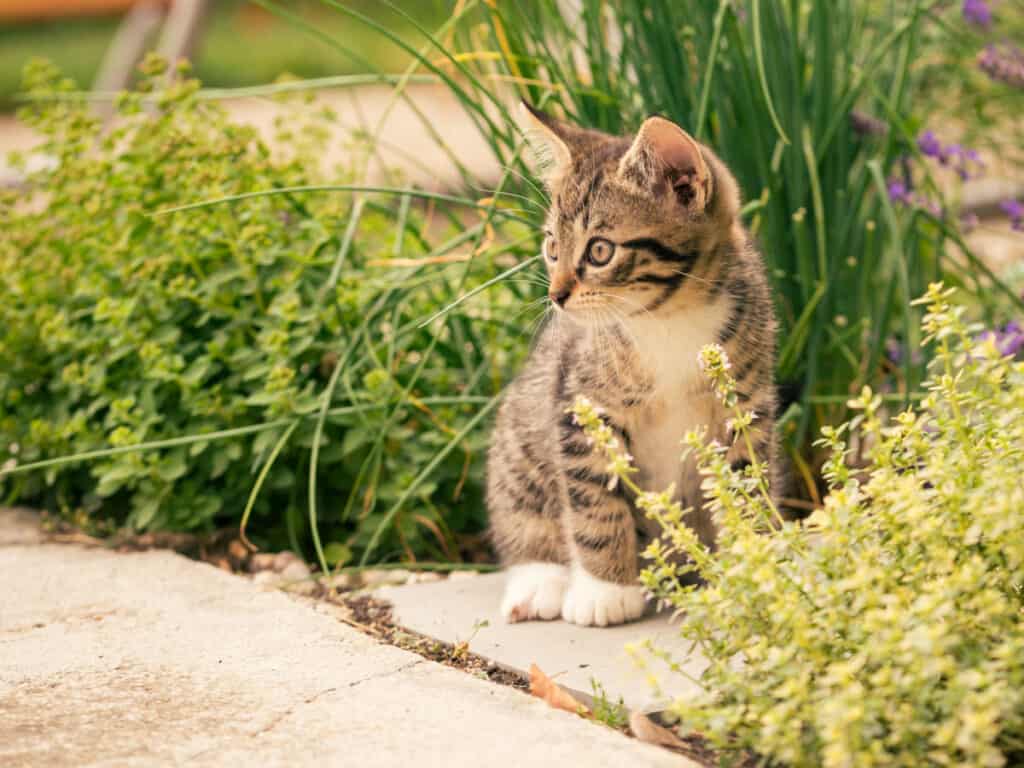
Many herbs also make excellent plants to repel cats. Lavender, rosemary, and citronella alongside lemon thyme, and oregano are good examples. These plants have strong smells that act as natural deterrents that can help create an invisible shield around your vegetable and flower gardens.
And a few flowers that cats don’t enjoy include geraniums and phlox because they cover the ground well. Thorny plants like roses can also discourage cats from digging around your garden.
Use Black Plastic to Grow Your Garden
Putting down a layer of black plastic before you plant your garden can keep cats from digging and using your garden as a litter box.
Since there is no soft dirt available for the cats to scratch in, they likely will go somewhere else to do their business. And a benefit of using black plastic in your garden is that you won’t have to spend as much time weeding and watering either.
Learn more: Is Using Black Plastic in the Garden Right for You?
Water Deterrents
Believe it or not, one of the most effective ways to keep those neighborhood cats away from your precious vegetable beds is as simple as using water.
Motion-activated sprinklers are a fantastic, high-tech solution. These smart gadgets sense when a cat or any other unwanted small animal strays into your garden. The sprinklers then unleash a gentle but surprising jet of water.
The beauty of using this method is its harmlessness. Cats receive a quick startle but are not harmed, making it a humane method to deter them.
If you’re after something a bit more hands-on, even a simple spray bottle or toy water gun can do the trick. Filled with plain water, a light squirt can discourage outdoor cats and stray cats from scratching in your garden. This may take multiple attempts but after a few bouts of getting wet, most cats will give up and do their business elsewhere.
Creating a Cat-Friendly Zone
One often overlooked method of keeping any critter out of your vegetable garden is to create an area specifically for that animal and they may leave the rest of the garden alone.
In your cat-friendly garden grow plants that cats enjoy. Besides the obvious cat grass and catnip, try growing licorice root or valerian. You may even want to include a few vining plants and some small shrubs to provide interest and hiding places for the cats.
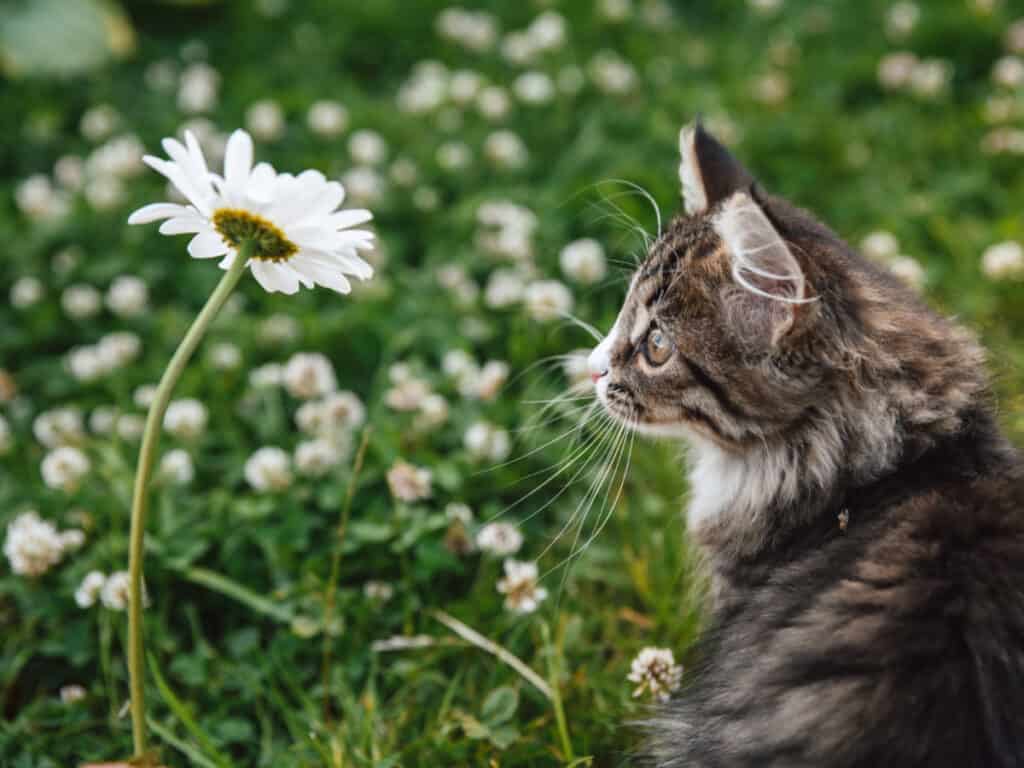
Adding a few flowering plants that aren’t harmful to cats like asters or cosmos can add some interest to the area and attract bugs for the cats to chase.
To make the area even more inviting to your feline friends consider adding some elements for cats to climb on, shady areas for days that it is hot, and a water bowl for the cats when they get thirsty.
Don’t forget to include an outdoor litter box or some soft soil for cats to use to relieve themselves. Doing so can encourage them to use this special area to do their business as cats tend to go to the same place over and over.
The Role of Other Pets as a Detterent
Sometimes, the most effective method for keeping cats out of your garden is using the presence of your own pets.
Most dogs have a tendency to chase small animals, including cats, that may wander into your garden. The mere presence of a dog patrolling the perimeter can act as a robust deterrent.
On the other hand, domestic cats are highly territorial animals. The scent markers left by your own cat can signal to other outdoor cats that this garden is already ‘claimed’ territory, potentially discouraging their visits.
When to Use Commercial Repellents
Sometimes, however, all the above tactics just don’t work. But, the leap to commercial solutions shouldn’t be taken lightly. Before you venture down this path, it’s crucial to ensure that these products are not only effective but also don’t endanger other animals or wildlife.
When all else fails – when the citrus peels, coffee grounds, and water sprays have done their best yet the problem persists – commercial repellents can be a viable option. However, selecting the right product is important.
Look for repellents that have garnered positive feedback for being effective without causing harm to the cats or the environment. The key ingredients should deter cats without causing them unnecessary distress or harm.
Most of these repellents that are safe will likely contain the essential oils of some of the plants and herbs listed above. I haven’t tried any of these commercial products in my own garden so I’m not going to recommend any here.
A Few Don’ts
There are also a few things you shouldn’t do if you want to keep cats out of your garden. First, don’t feed any strays that come around. If you keep feeding them, they will keep coming back to their food source and will be more likely to poop in your garden if that is where they are hanging out.
Also, don’t try to pet or be friendly to cats that you don’t want hanging around. I’m not suggesting you be mean, but don’t give unwanted cats attention that may cause them to stick around.
Some people suggest using ultrasonic devices to help keep cats away from your garden. However, much of the research I looked at said these devices were mostly ineffective. They may work briefly, but eventually, most cats will get used to the sound and ignore it.
Keeping a Garden Cat-Free
Whether you are a cat lover or hater, cats truly should be kept from defecating in your vegetable garden. But there are many ways to go about keeping a garden free of cats. Hopefully one of these suggestions or a combination of several will be enough to help you enjoy your garden cat-free.
Related Posts
- How to Keep Critters Out of the Garden – This post explains other methods of deterring wildlife.
- Grow a Deer Resistant Garden – Fruits, vegetables, and flowers that deer typically don’t enjoy.
- Easy Herbs for Beginners – Grow some of these herbs in your garden to help keep the cats away.

Meet Julie
I’m a farm girl born and bred in North Carolina. I’ve been growing a vegetable garden for over 20 years (and helping my Mom grow hers even longer). I’ve been raising chickens in my bathtub and backyard for 12+ years. I believe that homegrown food can be made simple. Let’s get started.
